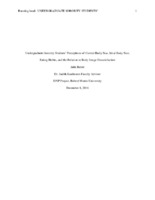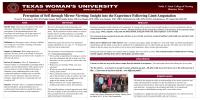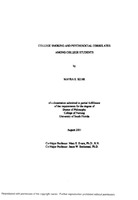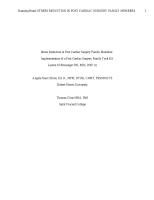| dc.contributor.advisor | Kaufmann, Judith | en |
| dc.contributor.author | Beiter, Julie | en |
| dc.contributor.author | Kaufmann, Judith | en |
| dc.contributor.author | Cline, Thomas W. | en |
| dc.date.accessioned | 2016-12-21T18:27:34Z | |
| dc.date.available | 2016-12-21T18:27:34Z | |
| dc.date.issued | 2016-12-21 | |
| dc.identifier.uri | http://hdl.handle.net/10755/621169 | |
| dc.description.abstract | <p>Disordered eating patterns and body discontent are widespread in Western society, especially among young women. Many adopt the “thin ideal,” a belief that women should have very slender bodies with small waists and minimal body fat. This body image is shaped by television, social media, and magazines. Research has shown that women who internalize the thin ideal are more likely to have concerns with body image dissatisfaction and disordered eating habits. The goal of the current descriptive correlational study was to examine relationships between perceived current body size, imagined ideal body size, actual body weight, eating patterns, and body satisfaction in undergraduate women. Fifty-three undergraduate sorority members completed a self-report survey that included scales to evaluate disordered eating (Eating Attitudes Test, EAT-26), body image satisfaction (Body Shape Questionnaire, BSQ-16), and weight perception (Photographic Figure Rating Scale, PFRS). Their actual BMIs were then calculated and correlated with their self reports on the three scales. Results suggest that there was a high degree of body positivity in this sample as actual current body weight and perception of ideal weight were significantly correlated. Those with the greatest discordance between their current weights and imagined ideal weights were at the highest risk for disordered eating habits and body image dissatisfaction. It appears the thin ideal continues to affect young women as those in higher weight ranges were more likely to have feelings of shame and inadequacy when comparing themselves with slimmer women. </p> | en |
| dc.format | Text-based Document | en |
| dc.language.iso | en | en |
| dc.subject | Thin-ideal | en |
| dc.subject | Disordered Eating | en |
| dc.subject | Perception of Body Size | en |
| dc.subject | Body Image Dissatisfaction | en |
| dc.subject | BMI | en |
| dc.title | Undergraduate sorority students' perceptions of current body size, ideal body size, eating habits, and the relation to body image dissatisfaction | en |
| dc.type | DNP Capstone Project | en |
| dc.rights.holder | <p>
All rights reserved by the author(s) and/or publisher(s) listed in this item record unless relinquished in whole or part by a rights notation or a Creative Commons License present in this item record.
</p><p>
All permission requests should be directed accordingly and not to the Sigma Repository.
</p><p>
All submitting authors or publishers have affirmed that when using material in their work where they do not own copyright, they have obtained permission of the copyright holder prior to submission and the rights holder has been acknowledged as necessary.
</p> | |
| dc.description.note | <p>This work has been approved through a faculty review process prior to its posting in the Virginia Henderson Global Nursing e-Repository.</p> | en |
| thesis.degree.grantor | Robert Morris University | en |
| thesis.degree.level | DNP | en |
| thesis.degree.year | 2016 | |
| dc.type.category | Full-text | en |
| dc.evidence.level | Other | en |
| dc.research.approach | Quantitative Research | en |
| dc.subject.cinahl | Body Image | en |
| dc.subject.cinahl | Eating Disorders | en |
| dc.subject.cinahl | Eating Disorders--Psychosocial Factors | en |
| dc.subject.cinahl | Perceptual Distortion | en |
| dc.subject.cinahl | Students, College | en |
| dc.author.details | Julie Beiter DNP (c), RN | en |
| dc.description.reviewtype | Faculty Approved: Degree-based Submission | en |
| dc.description.acquisition | Self-submission | en |





